FESTIVALS OF INDIA
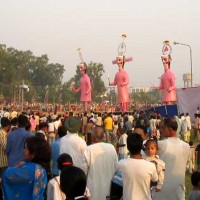
Dassera
The festival of Dassera, also known as Vijayadashmi, is one of the fascinating festivals of India and is celebrated with joy and enthusiasm for ten continuous days. The first nine nights are spent in the worship of goddess Durga and hence these nights are known as "Navaratri". This festival falls in the month of Ashwin (September/October). The tenth day of the Dassera day is in honour of Durga Devi.
It is celebrated twenty days earlier than Diwali. It marks the victory of Lord Rama over the demon king Ravana. Ram symbolizes good and Ravana represents evil.
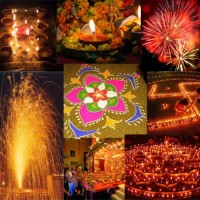
Deepaavali
The 14th Day of the dark half of Aashwayuja to the 2nd day of bright half of Kaartik.It is also called as - the Festival of Lights. Even the humblest of huts will be lighted by a row of earthern lamps. Crackers resound and light up the earth and the sky. The faces of boys and girls flow with a rare charm in their dazzling hues and colors. Illumination - Deepotsavas - in temples and all sacred places of worship and one the banks of rivers symbolize the scattering of spiritual radiance all round from these holy centres. The radiant sight of everybody adorned with new and bright clothes, especially ladies decorated with the best of ornaments, captures the social mood at its happiest.
The festival has a legendary background. Lord Rama in the era of Tretaya won a glorious victory over the demon king Ravana of Lanka. After the victory, He came to Ayodhya with his dear brother Laxman and wife Sita. The people of Ayodhya celebrated the victory by lighting candles and lamps. Thus Lord Ramachandra was congratulated.
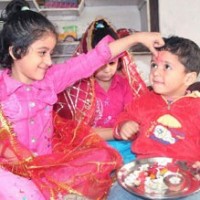
Bhayya Dooj
The fifth and final day of diwali festival is known by the name of Bhayya Dooj in the hindi-speaking belt, Bhai Phot in Bengal , Bhav Bij in the marathi-speaking communities and in Nepal by the name of Bhai Tika. After the diwali celebrations, sisters get ready for the most awaited 'Bhai Dooj' - when sisters ceremonize their love by putting an auspicious tilak or a vermilion mark on the forehead of their brothers and waves an aarti, she wishes him lot of love and protection from evil forces. Sisters are lavished with gifts, goodies and blessings from their brothers.
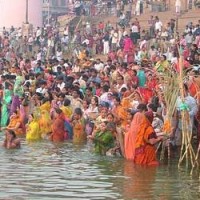
Chhath
Chhath (also called Dala Chhath) is an ancient Hindu festival and only Vedic Festival dedicated to the Hindu Sun God, Surya, also known as Surya Shashti. The Chhath Puja is performed in order to thank Surya for sustaining life on earth and to request the granting of certain wishes. The Sun, considered the God of energy and of the life-force, is worshiped during the Chhath festival to promote well-being, prosperity and progress. In Hinduism, Sun worship is believed to help cure a variety of diseases, including leprosy, and helps ensure the longevity and prosperity of family members, friends, and elders. They include holy bathing, fasting and abstaining from drinking water (Vratta), standing in water for long periods of time, and offering prashad (prayer offerings) and aragh to the setting and rising sun. It is also celebrated in the summer (March–April), on Chaitra Shashti, some days after Holi; this event is called Chaiti
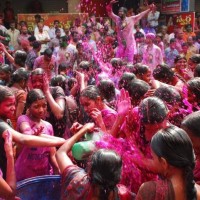
Holi
Holi is known as a festival of colours, fun and frolic. It is a festival of the Hindus. It usually comes in March.
There are different stories about the importance of the festival. It is said that at one stage a demon by name Tarakasura conquered all 'Lokas or worlds' including heaven and was teasing the 'Devas'. It became necessary for the Devas to pray to Lord Siva to bring forth a person who could conquer Taraka. But Lord Siva was in deep 'Tapas'. He was not showing any interest towards Parvati, who was devotedly serving him with a desire to marry. Then the 'Devas' requested 'Manmadha, the God of Love' to help them and disturb the 'Tapas' of Lord Siva. He shot his flower arrows at Lord Siva which disturbed his meditation. Lord Siva got angry and burnt 'Manmada' to ashes by opening his third eye. But the arrow had its effect and Siva had to love Parvati and Kartikeya was born, who later killed Tarakasura. The bonfire raisd on the festive occasion is to represent the 'Kamadahana' by Lord Siva.





